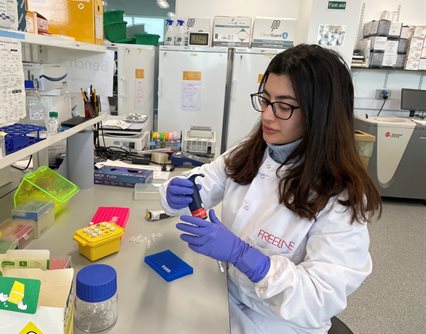 Parisa Rahimnashat studied the Applied Biomedical Science MSc and now works as a Research Assistant at Freeline Therapeutics. She tells us about what she enjoyed about the course and how it developed her skills for a career in bioinformatics.
Parisa Rahimnashat studied the Applied Biomedical Science MSc and now works as a Research Assistant at Freeline Therapeutics. She tells us about what she enjoyed about the course and how it developed her skills for a career in bioinformatics.
"Doing this course opened a prosperous working opportunity for me at Freeline Therapeutics with an excellenet career development path in bioinformatics."
What is your current role?
I currently work as a Research Assistant in Vector Design team at Freeline Therapeutics. Freeline is a liver-directed gene therapy company focused on developing and innovating gene therapies to create better lives for people with chronic monogenic diseases. As part of my role, I am responsible for the design and optimization of the recombinant Adeno-associated viruses (AAV) expression cassette and its production in large scales for testing. Vector design plays a crucial role in directing AAV-recombinant therapy to a specific tissue as well as regulating gene expression at therapeutic level.
Which aspects of your degree have been particularly useful in your current role?
Completing the Master's enabled me to gain expertise in molecular biology, bioinformatics, and genomics. Undertaking a 6-months research project allowed me to cultivate essential laboratory skills to become a more confident and competent researcher in cell and molecular biology. On the other hand, the taught modules introduced me to the computational side of science and research. Having a background in bioinformatics enabled me to implement and practice new innovating pipelines for improving AAV transgene expression.
Due to my enthusiastic approach to bioinformatics, Freeline Therapeutics have been supporting me to take on my second Master’s in bioinformatics as an apprentice at Cranfield University. Doing this course opened a prosperous working opportunity for me at Freeline Therapeutics with an excellent career development path in bioinformatics.
What did you enjoy the most?
The course director (Dr Axel Nohturfft) and other module leads are super friendly and supportive of their students learning. The university is well funded, and they always have PhD opportunities, scholarships, and grants for grabs! I was one of the lucky students who was granted a £10,000 scholarship to take on this amazing course.